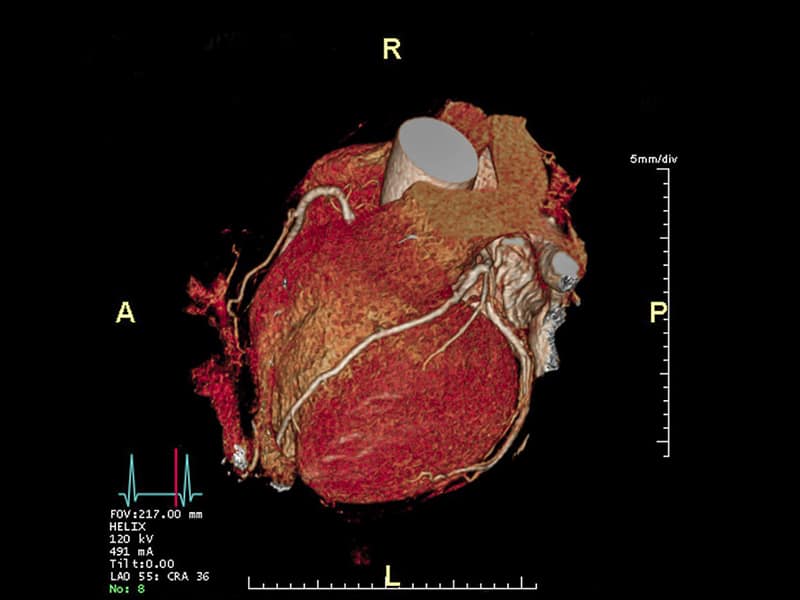Over 370,000 people die each year in the UK from Coronary Heart Disease (CHD) – a condition in which fatty substances build up over the years inside the arteries of the heart. The build up (‘furring up’) of these fats (plaques) leads to a narrowing of the artery (stenosis) which can cause a progressive reduction in the supply of oxygen to the heart, especially when the heart is beating more quickly during exercise. Sometimes, these plaques rupture causing a blood clot to form on top of the affected area, which results in complete blockage i.e. a heart attack.
While CHD may lead to angina (pain in your chest) and breathlessness both of which can be precursors to a heart attack of some form, many patients do not get any symptoms or advanced warning of impending problems, and indeed CHD remains the commonest cause of sudden death in men over the age of 50. Further, approximately 1/3rd of individuals who suffer a heart attack have no risk factors.
However, modern CT scanning of the heart enables us to make an extremely accurate assessment of the earliest signs of CHD and thus to implement effective treatment strategies. The formation of plaques is usually accompanied by the deposition of calcium (chalk) within the plaque and this shows up extremely well on a CT scan. The so called coronary artery calcium (CAC) score provides an accurate and objective assessment of an individual’s overall risk of suffering a future heart attack, as opposed to a statistical risk based on population derived risk factors.
Occasionally the plaque does not calcify and the CAC score would be falsely reassuring. The ultimate assessment for the presence of CHD is the CT coronary angiogram which enables us to see directly inside the heart arteries and to detect plaque which has not calcified. This ‘soft’ plaque is the most vulnerable to causing a heart attack and is called ‘the widow maker’ being the most common cause of sudden death in otherwise fit and healthy middle aged men. One of the organisations Echelon Health works closely with analysed the detailed results of the CT Coronary Angiogram scans on 275 senior employees from a high profile and respected company a couple of years ago. The results demonstrated that for Coronary Artery Calcium scores, some 6.5% of the group had a score >400 which in some studies equates to a >20 fold increased risk of a heart attack.
Without screening, this would not have been identified, especially as none of these employees showed any symptoms. Worse still, the detailed CT angiogram images of the inside of the arteries of those same employees (utilising a resolution of just 0.3 mm) showed that:
- 3% had vulnerable ‘soft’ plaque only
- 4% had ‘soft’ plaques causing >50% stenosis (narrowing) and are the group most vulnerable to sudden death. By having a preventative health assessment utilising a CT Coronary Angiogram, all these employees were able to take preventative measures to mitigate the future risk of a heart attack and early death.
